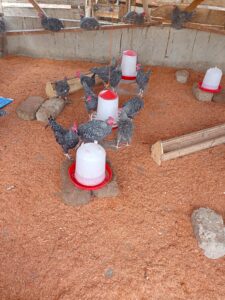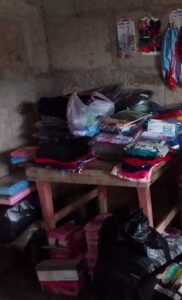Writing from a Nameless Community; in the middle of nowhere
Dear friends,
I received a rather unusual message from my colleague Lydia Adomako. Lydia leads our work with women’s economic empowerment in Ghana, and is a recipient of the Merry Fredrick Leadership Award. The subject was: “Writing from a nameless community; in the middle of nowhere”. You will find this moving message below. It’s a longer read, but I promise you it’s worth your time. -Nora Tobin, Executive Director
——————————————————–
Dear Nora,
I hope this mail finds you well. It is quite unusual for me to seek you out like this, bypassing all protocols,
but something happened to me that I thought I should share with you.
There is a potential micro-credit client, Stephen, who has been persistently asking us to buy him a tricycle. He was referred to us by Mr. Kusi and George. The gentleman is relentless in his pursuit of us. Not a day goes by without receiving a call from him. I first sent my team to conduct a risk assessment and report their findings. He met them at Abompe during one of our training sessions, and there was a discussion between them. Their conclusion was an outright “NO!”
Stephen wouldn’t stop calling. So, on Thursday, October 19, we had a meeting with Bedabour, and from there, we visited his place at Bonkwaso. In a straight route, Bedabour is not far from Bonkwaso, but the road leading to the place was in very bad shape, and the bridge had been flooded, making it impassable. We had to return to Kumasi and use a different road (they are in different districts) to reach Bonkwaso, where he was expecting us.
According to the directions he provided, we reached the outskirts of Bonkwaso and parked our vehicle by the roadside. We asked some passersby, mostly farmers, for directions, but nobody wanted to help, likely because they thought we meant him harm or had other reasons. We decided to find our way there no matter what. I wanted to meet him in person to understand the role the tricycle would play in his family and his farming business. For the next 30 minutes, we were walking through the jungle—cocoa farms, palm plantations, orange plantations—without coming across a single hut.
Then it dawned on me, and all the “what if” questions came to mind: What if they have a medical emergency? What if they are attacked in any form? What if this, what if that, and so on. The most important “what if” question came about after we finally arrived at the place where his hut is: WHAT IF SELF-HELP INTERNATIONAL DIDN’T EXIST?

I wanted to cry, and I did cry. The hut is in the jungle, in the middle of nowhere. They have school-age children who walk more than an hour through the jungle to school every day. These kids are subject to all forms of hazards—merciless rainfall and sunshine, poisonous snakebites, the potential of being kidnapped, and many more dangers. Just imagine the rest.
We concluded our business with Stephen, and I asked how he got to know about us. He said his neighbor is my client, and she recommended that he should talk to me because I would listen. He also added that she recently lost a baby because the fetus was in distress by the time they got to the hospital due to a lack of transportation to the health center. I knew Barikisu (the name of my female client) was pregnant, and for some time, she had delayed in her loan repayment; I was looking for her. We walked another fifteen minutes to Barikisu’s place, met her family, and expressed our condolences to them. The living conditions of these people left me thinking throughout the day and into the night.
On our way home, I kept thinking about what if Self-Help International didn’t exist? What would happen to these people? Who would be willing to lend them money to go about their daily lives, take care of their families, live dignified lives, and dare to dream?
Now, I am sharing this with you because I want you to know and understand the important work you are doing. I’m sure you know already, but I need to reiterate it.
So, the next time you organize a fundraising activity or come across a donor or potential donor, and they ask why they should make any financial contribution, tell them these things I’m sharing with you:
- They are changing and impacting lives in another part of the world.
- People are feeling like human beings because they are living dignified lives, thanks to their contributions.
- People are daring to dream because of them.
- A new kind of hope is being renewed in people’s hearts and minds because of their contributions.
The point is they may not be able to come here in person. Nonetheless, their contributions, no matter how big or small they may be, the hearts with which they are giving, are working wonders for people who would otherwise have no hope of their current situations improving for the better.
You also let them know that the recipients are forever grateful, and at the mention of the name of Self-Help, their eyes light up with appreciation.
Lydia




